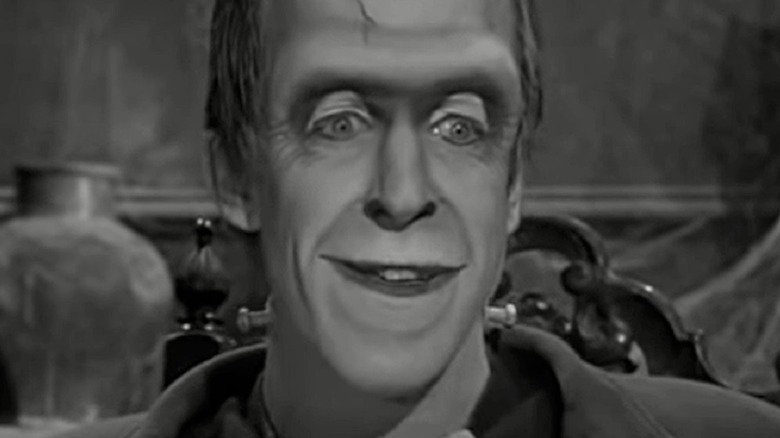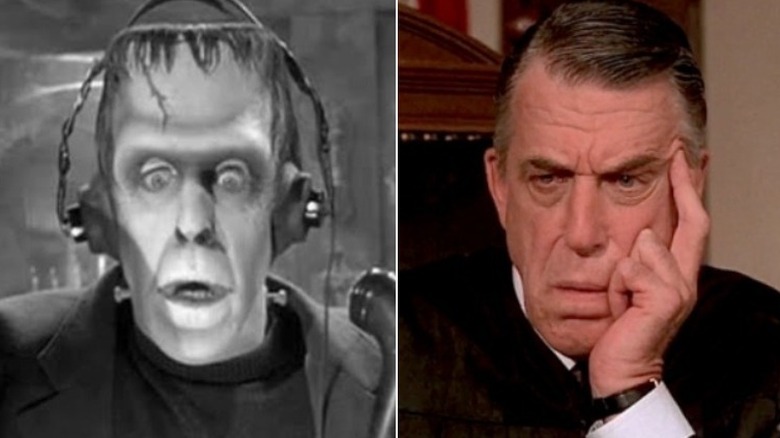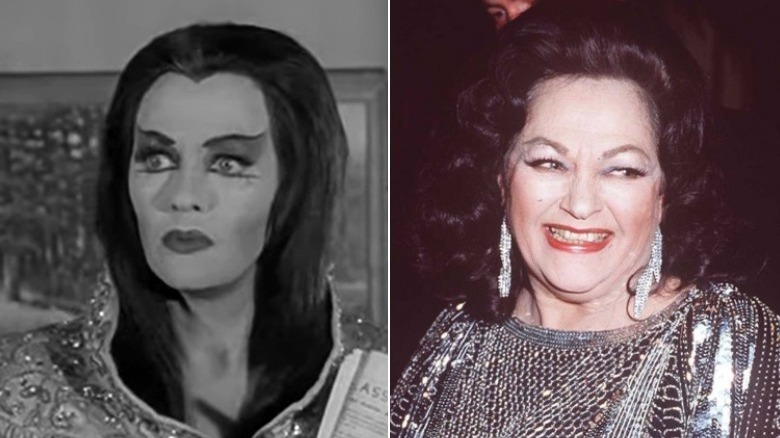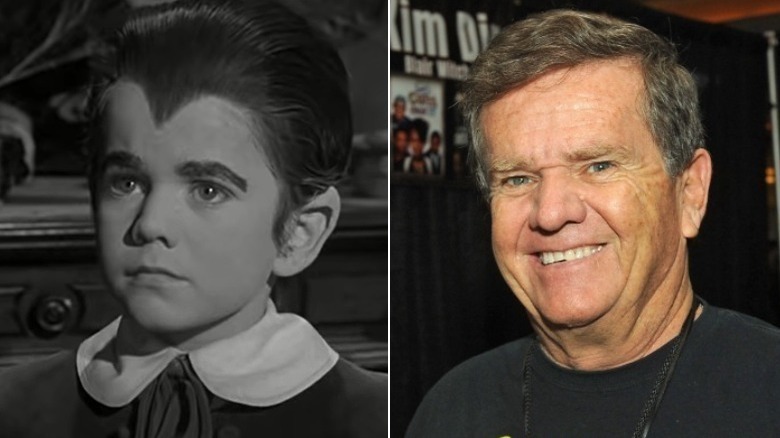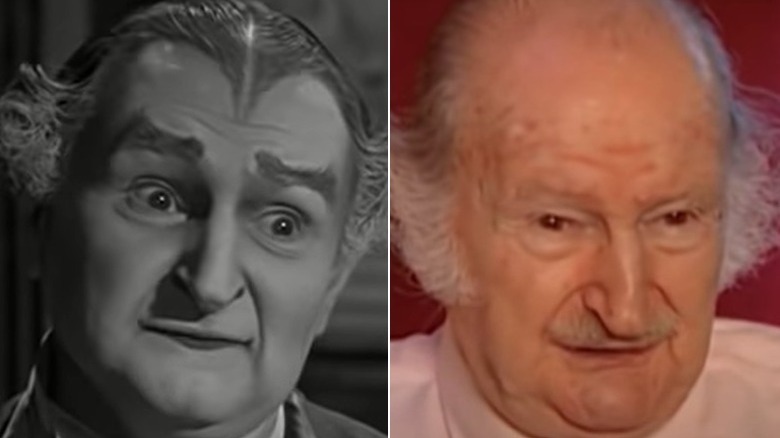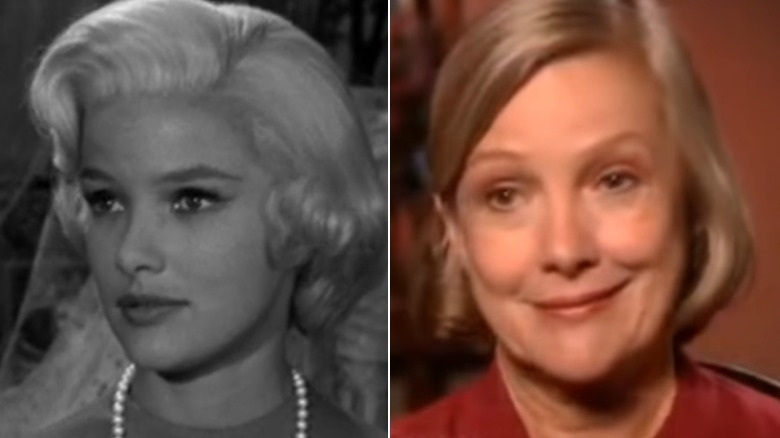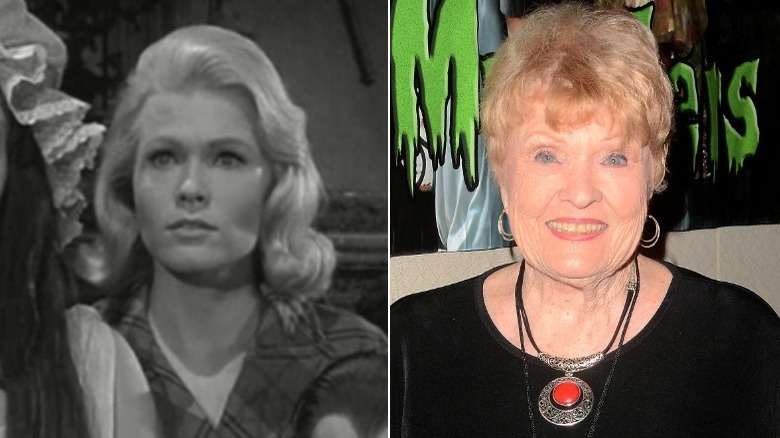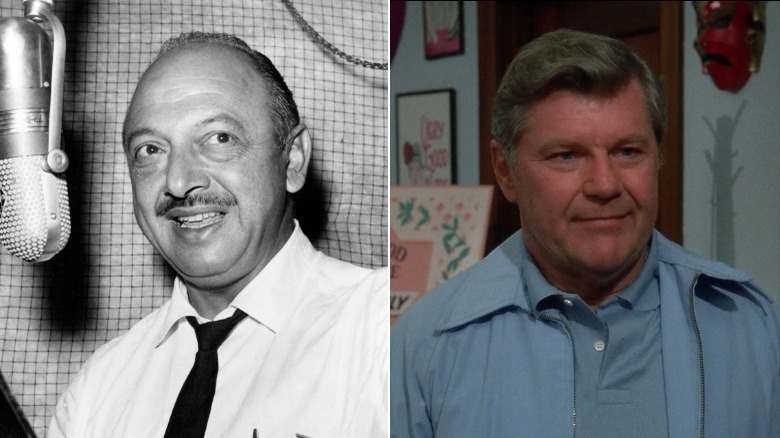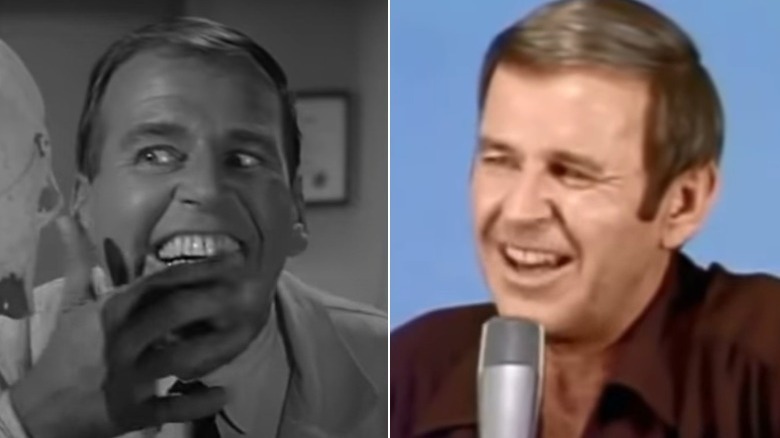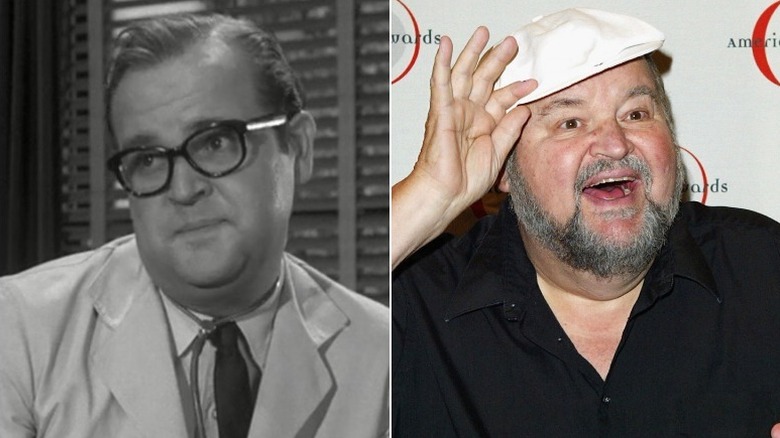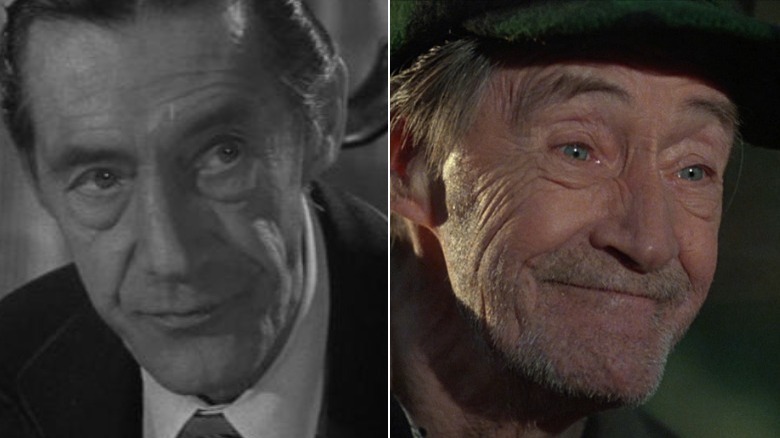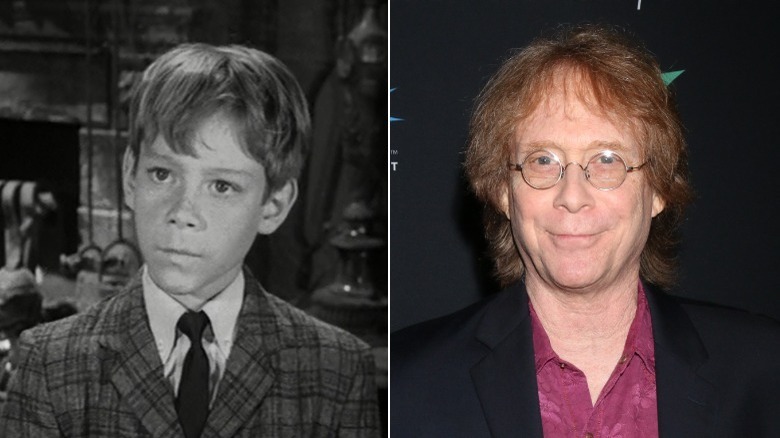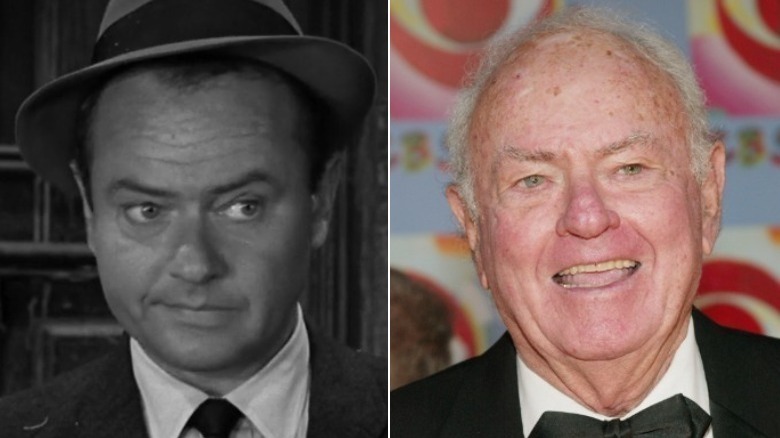What The Cast Of The Munsters Did After The Show Ended
It's surprising to look back and realize the original run of CBS' "The Munsters" lasted a mere two seasons. Premiering in September 1964, the Munster home closed its doors to visitors in 1966. Syndication, however, would breathe new life into the series and find a whole host of new fans, eventually rendering it one of America's most iconic sitcoms.
With its clever premise, "The Munsters" is able to poke fun at earlier family sitcoms, as well as popular monster movies. Unlike their counterparts on ABC's "The Addams Family" — whose series premiere and finale dates mirror those of "The Munsters" almost to the month — the characters of the Munsters household are largely harmless and surprisingly normal folk who just happen to be Frankenstein's Monster, Count Dracula, a young Wolfman, etc. The only exception is the young and lovely Marilyn, niece to Herman and Lily (who often express sympathy for what they call her "hideousness").
Sadly, the majority of the sitcom's principal cast is no longer with us. Still, both those who survive and those who've left us made sure to lead lives much more colorful than the black-and-white show we remember them for. For more details, keep reading to learn what happened to the cast of "The Munsters" after the show ended.
Fred Gwynne kept making us laugh
One of the most recognizable faces from "The Munsters" is that of the late Fred Gwynne, who plays Herman Munster. In spite of being the very definition of a gentle giant, his appearance is so similar to that of Frankenstein's Monster that the very sight of Herman often inspires not only people to flee in terror but, sometimes, animals or even inanimate objects.
Previously known to audiences as the hapless Officer Muldoon on "Car 54, Where Are You?," Gwynne nevertheless found himself typecast after "The Munsters." Still, Gwynne kept working in film and TV, as well as pursuing other passions. In particular, Gwynne was a writer and illustrator of children's books. His first book, "Best in Show," hit stores in 1958, and between then and his death in 1993, he would go on to write and draw more pun-filled picture books like 1970's "The King Who Rained" and 1976's "A Chocolate Moose for Dinner." His final children's book, "Pondlarker," was published in 1990.
Interestingly, while his role of Herman Munster came relatively close to the beginning of his career, his two other famous roles came near the very end. In 1989, he starred as the grandfatherly neighbor Jud Crandall in the original adaptation of Stephen King's "Pet Sematary." The year before his death to pancreatic cancer, Gwynne made his final major motion picture appearance — and one of his most beloved — as the stern Judge Haller in the classic legal comedy "My Cousin Vinny."
Yvonne De Carlo racked up the credits
While Herman might be bigger than everyone else, it's clear things would fall apart without the Munster matriarch, Lily, played by the late Yvonne De Carlo. Smarter than her well-intentioned but often dim-witted husband and caring deeply for her entire family, Lily is the glue that keeps the Munster household from crashing down around everyone's ears.
De Carlo was an ambitious actress who made big footsteps in Hollywood long before "The Munsters." She was appearing in bit movie parts as far back as the early '40s, and her breakthrough came when she was cast as Moses' wife, Sephora, in 1956's biblical epic "The Ten Commandments." The following year, she landed the female lead opposite Clark Gable in "Band of Angels." After "The Munsters" she continued to work in TV and movies, eventually appearing in almost 100 films during her lifetime.
De Carlo died in January 2007 of heart failure. She was 84 years old. De Carlo's son, Brian Morgan, told Reuters she'd worked on two independent films before her death, but as of 2021, they'd yet to be released.
Butch Patrick almost shut down a school
With that famous widow's peak, pointed ears, and fangs, the young Butch Patrick plays Eddie on "The Munsters" — a kind of werewolf/vampire hybrid who's son to Herman and Lily and master of Woof-Woof, the Wolfman doll often found in his arms. In 2004, Patrick told The Seattle Times that at the age of 10, he won out over 500 other kids to become Eddie Munster.
While Eddie Munster would remain Patrick's biggest cultural splash, he rarely if ever expresses anything but gratitude about the role in interviews. He told The Seattle Times the only "rough time" he ever experienced in terms of being associated with "The Munsters" was right after the show was canceled. Patrick said his Eddie Munster fame inadvertently caused problems. "Wherever I went, 3 or 400 kids would follow," Patrick recalled, claiming the resulting disturbances got him expelled from junior high.
Patrick made a lasting impression in kids' TV in the 1971-73 Saturday morning show "Lidsville," but it wasn't long after that he took a long break from acting. For the most part, he's taken smaller, self-referential roles in the 21st century, like playing himself in the 2003 comedy "Dickie Roberts: Former Child Star." While he was a child when he first worked with them, he told ComingSoon.net in 2017 that, before their deaths, he was able to reconnect and form friendships with his former co-stars Al Lewis and Yvonne De Carlo
Al Lewis loved tall tales and causing trouble
What happens when Count Dracula retires? He becomes Grandpa Munster. Spending much of his free time working in the Munsters' basement laboratory, Grandpa's experiments often cause trouble in the family, and even when they don't, he goes out of his way to start problems by constantly trying and failing to bite everyone's arm.
While Lewis continued to act professionally until a few years before his death, there was nothing quite as memorable as his turn as Grandpa Munster, and considering his subsequent work, he seemed to have been the most comfortable with the post-series typecasting. For example, Lewis was the only member of the original cast to lend his voice to the ultimately unsold 1973 animated pilot "The Mini-Munsters." Lewis was also extremely comfortable using his time on "The Munsters" in later pursuits, like his run as the Green Party candidate for the governorship of New York State, when he unsuccessfully attempted to get his name on the ballot listed as "Grandpa Al Lewis."
Lewis died in February 2006 of natural causes at the age of 82. There was initially some confusion regarding his age at the time of his death, due in no small part for Lewis' own mischievous storytelling. Lewis was known to blatantly lie about his past, including claiming that Charlie Manson babysat his children and that he had "worked every single entertainment medium, including some that don't exist."
Beverley Owen left The Munsters early
In a house full of monsters, the pretty one is the outcast — serving as proof is Marilyn Munster, niece to Herman and Lily. In fact, the more "unique" looking characters would often comment on her "plain" looks. While another actress would soon replace her, Marilyn was played by Beverley Owen for the first 13 episodes of "The Munsters."
According to "The Munsters" co-star Butch Patrick, Owen was well-liked among the cast, but she was nevertheless "very homesick and in love" with her future husband Jon Stone. Patrick told The Seattle Times that Owen begged to be let out of her contract without luck, until co-stars Fred Gwynne and Al Lewis stood up for her and threatened a full cast walkout. Patrick said, "They let [Owen] go, but they blackballed her, and she never worked again." This was an exaggeration ... but not by much. Her only post-"Munsters" screen work — beside the posthumously released unaired "Munsters" pilot — was a brief stint as Dr. Paula McCrea on the soap opera "Another World."
We don't know a lot about Owen's life after the early '70s. According to Deadline, she divorced the late "writer, producer, and editor" Jon Stone in 1974, and in 1989, she earned a master's in early American history. In February 2019, at the age of 81, Owen died of ovarian cancer.
Pat Priest got all she wanted from acting
While Beverley Owen didn't stay with "The Munsters" long, her character of Marilyn Munster remained in the series. And in Season 1's "Grandpa Leaves Home," actress Pat Priest made her first "Munsters" appearance, replacing Owen. Priest remained in the role until the end of the series, though she was replaced by Debbie Watson for the 1966 feature "Munsters, Go Home!" — a fact that stung at the time. "I was devastated not to be in the film," Priest said in a 2020 interview, explaining, "I was 29, and my contract was up for renewal, so I think they wanted a younger actress and didn't want to pay me more."
After "The Munsters," Priest made one-off appearances in series like "Bewitched," "Mission: Impossible," and "The Mary Tyler Moore Show," but she retired from professional acting by the end of the '70s, with seemingly few regrets. In 2019, she said in an interview (via the Mansfield News Journal), "I've done everything I wanted to do and gone everywhere I wanted to go. I'm 83 now, and whatever happens in the future is all just pluses."
She did, however, lightheartedly point out a missed opportunity. In 1967, Priest co-starred with the late Elvis Presley in the musical comedy "Easy Come, Easy Go," and not only did she neglect to ask for an autograph, but she bought a Cadillac from the King and traded it in a few years later rather than storing it and "using it for one of [her] retirement plans."
Mel Blanc and Bob Hastings were both fan-favorite voice actors
A smart-mouthed and unnamed raven is a regular feature on "The Munsters." The bird pops out of the cuckoo clock to deliver its quips, usually at Herman Munster's expense. While we don't know what happened to the prop, we have some info on the two actors who voiced the bird at different times — Mel Blanc and Bob Hastings.
Nicknamed "The Man with a Thousand Voices," Mel Blanc is one of the most influential voice actors in entertainment. He first became famous for voicing such iconic "Looney Tunes" characters as Porky Pig and Bugs Bunny, and he later played famous Hanna-Barbera characters on shows like "The Flintstones" and "The Jetsons." Blanc died in July 1989 at the age of 81 due to complications from emphysema and coronary artery disease.
And while Bob Hastings' voice work grew much more prolific in his later years, he was best known as Captain Binghamton's useless yes-man, Lt. Elroy Carpenter, on "McHale's Navy." In the '70s, he enjoyed the memorable recurring role of bar owner Tommy Kelsey on the controversial sitcom "All in the Family." While his face may be more recognizable to older audiences, his voice is doubtless more familiar to younger ones. In "Batman: The Animated Series" — as well as many of the series, video games, and features that sprang from it — Hastings is the voice of Commissioner James Gordon. Hastings died in 2014 from prostate cancer. He was 89 years old.
Paul Lynde made us laugh before he left
If you're a monster, your best option for medical care just might be the recurring character Dr. Dudley, played by the late Paul Lynde in his first three appearances. Along with being as clumsy as Herman Munster, Dr. Dudley has remarkably bad eyesight, which is probably why he doesn't run screaming when the Munsters come in for check-ups.
Paul Lynde was one of the most recognizable faces of comedy in the sitcoms of '60s America. Along with "The Munsters," Lynde would regularly pop up in sitcoms like "I Dream of Jeannie," "The Flying Nun," and "F Troop." In one of his most beloved roles, he played uncle to the incognito witch Samantha (Elizabeth Montgomery) on "Bewitched." He was also a favorite on the celebrity game show "The Hollywood Squares" since its beginning. "Looney Tunes" legend Mel Brooks once said of Lynde that he was such a natural comedian that he could make audiences laugh by reading "a phone book, tornado alert, or seed catalogue."
Lots of urban legends swirled around Lynde's death in 1982 at the age of 55. He was found in his bedroom by his friend, Paul Barresi, and soon rumors spread that his body was found naked, with implications that he'd been murdered either by a secret lover or a sex worker. In later years, however, investigations confirmed the coroner's report that a heart attack was to blame for Lynde's passing.
Dom DeLuise was one of the world's favorite funny men
By Season 2 of "The Munsters," Paul Lynde was busy playing a witch's uncle on ABC's "Bewitched," so for Dr. Dudley's appearance in "Just Another Pretty Face," Lynde was replaced by the rising comedy star Dom DeLuise.
By the '80s, DeLuise was a household name. He was a regular fixture in Burt Reynolds comedies — particularly Reynolds' signature film series like "Cannonball Run" and "Smokey and the Bandit." He's also in most of the best Mel Brooks comedies, including 1974's "Blazing Saddles," 1981's "History of the World, Part I," and 1993's "Robin Hood: Men in Tights." And it wasn't just adults that DeLuise made laugh. The funny man's voice made memorable contributions to animated films like "The Secret of NIMH" and "An American Tail." Not to mention that he plays the talent agent who takes notice of Kermit the Frog's crooning in the first scene of 1979's "The Muppet Movie."
In May 2009, DeLuise died from kidney failure. He was 75 years old. Speaking of his old collaborator, Mel Brooks recalled that DeLuise "created so much joy and laughter on the set that you couldn't get your work done." Brooks added that every time he cast DeLuise in a film, he added two days to the filming schedule "just for laughter."
John Carradine left behind a long filmography and a family of actors
In the world of "The Munsters", even monsters need gainful employment, and Herman provides for his family by working, fittingly, at Gateman, Goodbury, and Graves Funeral Parlor. Herman's stern boss is one of the partners, Mr. Gateman, played the by the late, prolific actor John Carradine.
In addition to classics like "Stagecoach" and "The Grapes of Wrath," Carradine was known for regularly appearing in low-budget films, particularly B horror movies. He claimed he'd appeared in "nearly 500 movies," also saying he'd shown up uncredited in about 30 features before his first credited job in 1930's "Tol'able David." He was often unromantic in speaking about his career, saying, "I think I'm better at acting than I am at dairy farming, and that's why I'm involved in it." He also advised his sons to steer clear of acting, though none of them took his advice.
While Bruce Carradine's career didn't last long, the Carradine legacy includes Robert Carradine ("Revenge of the Nerds"), Keith Carradine ("Nashville," "Deadwood") and the late David Carradine ("Kung Fu," "Kill Bill"). After playing in films like "The Shootist," "The Howling," and "The Secret of NIMH," John Carradine died in December 1988 of kidney and heart failure. He was 82 years old.
Bill Mumy was Eddie's rudest friend
While Eddie Munster's friend, Googie, only makes a single appearance in "The Munsters," it proves to be a memorable one. In spite of being a little boy surrounded by literal monsters, in some ways, Googie is the most monstrous in Season 1's "Come Back, Little Googie." For example, after being introduced to Grandpa Munster, he quips, "I never seen a penguin smokin' a cigar before." When he meets Herman, he shocks the big man with a hidden hand buzzer (though, to be fair, considering Herman is Frankenstein's Monster, you'd think electric shocks wouldn't be such a big deal).
Googie is played by the young Bill Mumy, who would go on to become an icon of sci-fi fandom. He would land his most famous role as Will Robinson in "Lost in Space" the same year he appeared on "The Munsters." Along with brief appearances in series like "The Rockford Files," "Matlock," and "Alfred Hitchcock Presents," he kept expanding his geek cred by landing roles in beloved sci-fi series. For example, he played the loyal diplomatic aide Lennier in "Babylon 5," and while it was only a one-off, he starred as a Starfleet officer in one of the most emotionally powerful episodes of "Star Trek: Deep Space Nine," Season 7's "The Siege of AR-558."
Mumy is also a songwriter, singer, and musician who earned an Emmy nomination for "Outstanding Music Direction and Composition" for his work on the puppet musical series "Adventures in Wonderland."
Harvey Korman was one of the 1970s' best comedians
Before so many TV series turned to serial formats, it wasn't at all rare for certain actors to show up in sitcoms multiple times as completely different characters, and such was the case with the late Harvey Korman on "The Munsters." Korman appeared three times on the sitcom, each time in a new role. In Season 1's "Family Portrait", he's photographer Lennie Bates. And he's there for the season finale "Yes, Galen, There is a Human" as German psychiatrist Dr. Leinbach, and in Season 2's "Prehistoric Munster," he's the eminent scientist Professor Gearhart von Fagenspahen.
Like "Munsters" veterans Paul Lynde and Dom DeLuise, Korman was one of the most beloved comedian actors of the '70s, one often associated with Mel Brooks. Perhaps his most well-remembered film role is the crooked attorney general Hedley Lamarr in 1974's satirical "Blazing Saddles." On the small screen, he was extremely popular as what he described as "luminous second banana" to the titular host of the decades-spanning variety/sketch comedy hit "The Carol Burnett Show."
In 2008, at the age of 81, Korman died of complications due to an abdominal aortic aneurysm.
